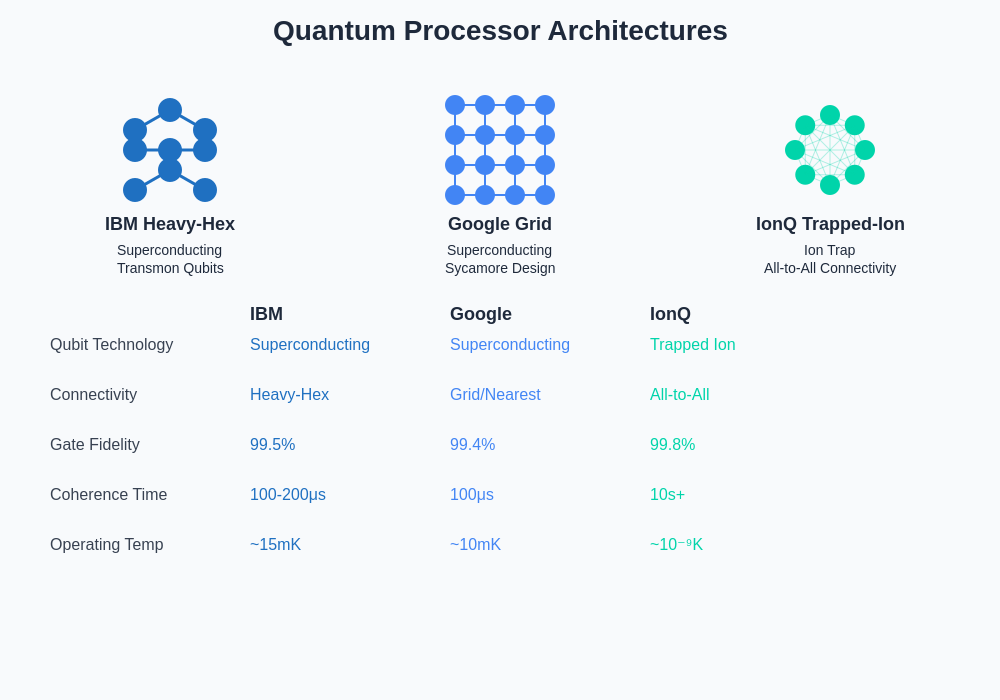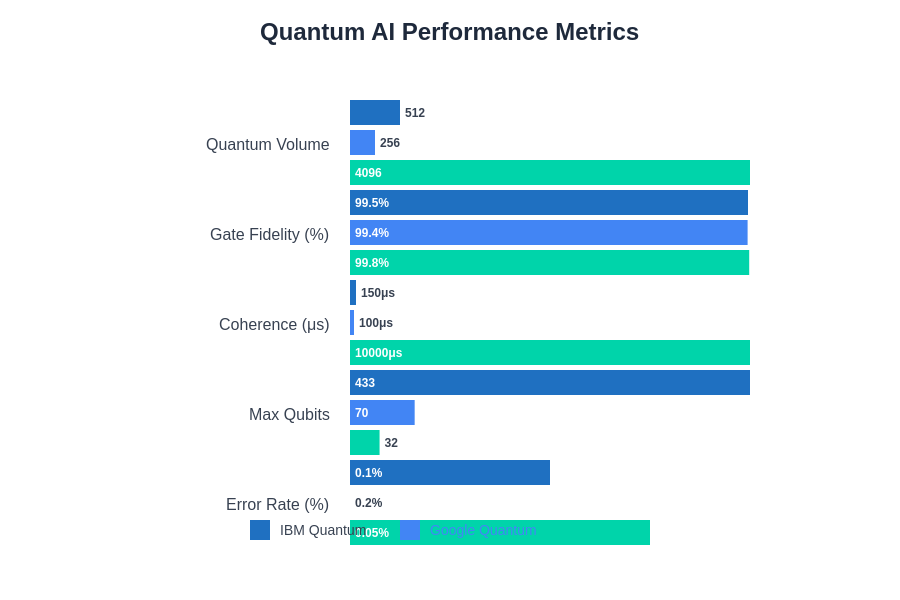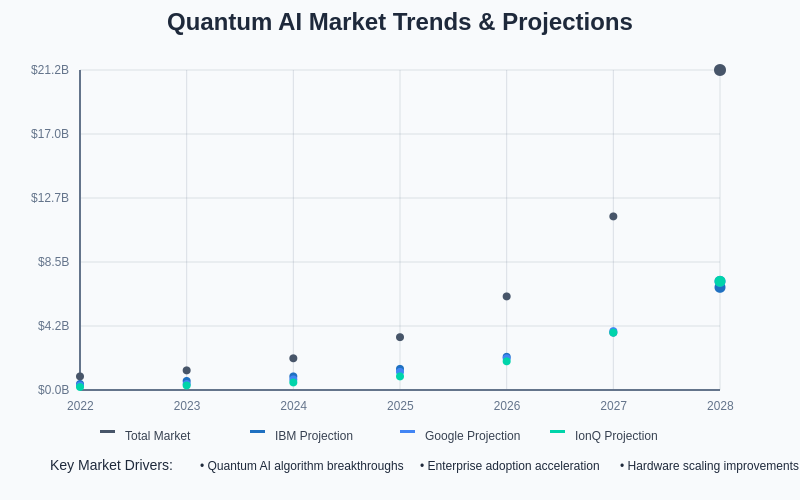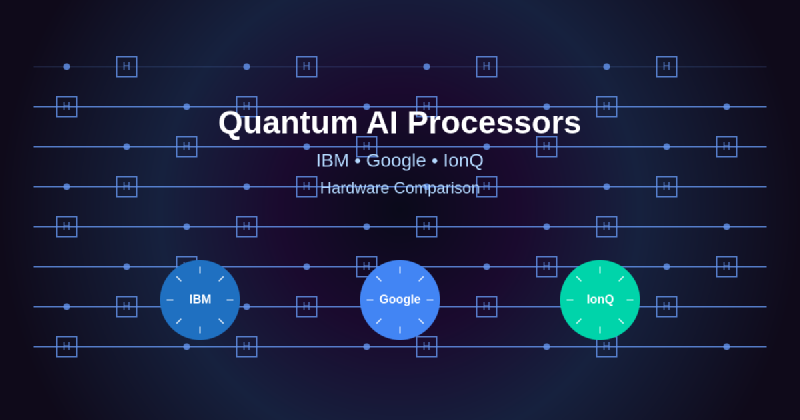The convergence of quantum computing and artificial intelligence represents one of the most transformative technological developments of our era, promising computational capabilities that could revolutionize everything from drug discovery to financial modeling. At the forefront of this quantum revolution stand three pioneering companies whose quantum AI processors are pushing the boundaries of what’s computationally possible: IBM with its superconducting qubit systems, Google with its breakthrough quantum supremacy demonstrations, and IonQ with its trapped-ion quantum computers. Understanding the fundamental differences, advantages, and limitations of these quantum AI processors is crucial for organizations looking to harness the power of quantum-enhanced artificial intelligence.
Stay updated with the latest quantum computing developments as this rapidly evolving field continues to produce groundbreaking innovations that could reshape the technological landscape. The quantum computing industry is experiencing unprecedented growth, with each major player pursuing distinct technological approaches that offer unique advantages for different types of quantum AI applications.
The Quantum Computing Landscape and AI Integration
The integration of quantum computing principles with artificial intelligence algorithms has created a new paradigm where quantum processors can potentially solve certain classes of problems exponentially faster than classical computers. This quantum advantage becomes particularly pronounced in optimization problems, machine learning tasks involving large datasets, and complex pattern recognition challenges that are fundamental to modern AI applications. The three leading companies in this space have each developed unique approaches to quantum processor design, resulting in systems with distinct characteristics, capabilities, and optimal use cases.
IBM’s approach centers around superconducting transmon qubits arranged in heavy-hex lattice topologies, providing excellent connectivity and error correction capabilities that make their systems particularly suitable for near-term quantum algorithms and hybrid classical-quantum AI applications. Google’s quantum processors utilize superconducting qubits in grid arrangements optimized for demonstrating quantum supremacy and exploring quantum machine learning algorithms. IonQ’s trapped-ion systems offer exceptional qubit fidelity and all-to-all connectivity, making them ideal for quantum AI applications requiring high-precision quantum operations and complex entanglement patterns.
IBM Quantum Processors: Engineering Excellence in Superconducting Systems
IBM has established itself as a leader in quantum computing through its comprehensive quantum computing ecosystem, anchored by increasingly sophisticated superconducting quantum processors. The company’s quantum AI processors have evolved from early proof-of-concept systems to production-ready quantum computers capable of running sophisticated quantum algorithms for artificial intelligence applications. IBM’s current flagship systems, including the 433-qubit Osprey processor and the upcoming 1000+ qubit Condor processor, represent significant advances in quantum processor design and manufacturing.
The architecture of IBM quantum processors is built around superconducting transmon qubits that operate at temperatures near absolute zero, maintained within sophisticated dilution refrigerators that create the ultra-low noise environment necessary for quantum coherence. These qubits are fabricated using advanced semiconductor manufacturing techniques on silicon substrates, with each qubit consisting of Josephson junctions that create the nonlinear energy levels essential for quantum computation. The heavy-hex lattice connectivity pattern employed by IBM provides each qubit with connections to multiple neighbors, facilitating efficient quantum error correction and enabling complex quantum AI algorithms that require extensive qubit interactions.
Experience advanced AI capabilities with Claude for research and analysis tasks that complement quantum computing development workflows. IBM’s quantum processors excel in applications requiring stable, repeatable quantum operations, making them particularly suitable for quantum machine learning algorithms, optimization problems in supply chain management, and quantum-enhanced feature mapping for classical AI systems.
Google Quantum AI: Pioneering Quantum Supremacy and Beyond
Google’s quantum AI division has achieved several historic milestones in quantum computing, most notably the demonstration of quantum supremacy with their Sycamore processor, which performed a specific computational task faster than the world’s most powerful classical supercomputers. Google’s quantum processors are built using superconducting qubits similar to IBM’s approach but with distinct architectural choices that optimize for different types of quantum computations and AI applications.
The Sycamore processor, featuring 70 superconducting qubits arranged in a two-dimensional grid pattern, represents Google’s commitment to developing quantum systems optimized for near-term quantum algorithms and quantum AI applications. Each qubit in the Sycamore architecture is a transmon-style superconducting circuit that can be individually controlled and measured, with nearest-neighbor coupling that enables the implementation of two-qubit quantum gates essential for quantum AI algorithms. The processor’s design emphasizes gate fidelity and coherence times, crucial parameters for maintaining quantum information during the execution of complex AI-related quantum algorithms.
Google’s approach to quantum AI extends beyond hardware into software and algorithmic development, with significant investments in quantum machine learning frameworks, variational quantum algorithms, and quantum neural networks. Their quantum processors are particularly well-suited for exploring quantum advantage in machine learning tasks, quantum sampling problems, and optimization challenges that arise in training large-scale AI models. The integration of classical AI techniques with quantum processing capabilities has enabled Google to explore hybrid algorithms that leverage the strengths of both classical and quantum computing paradigms.
IonQ’s Trapped-Ion Innovation: Precision and Connectivity
IonQ has carved out a unique position in the quantum computing landscape through their innovative use of trapped-ion technology, which offers distinct advantages for quantum AI applications requiring high-fidelity quantum operations and flexible qubit connectivity. Unlike superconducting approaches used by IBM and Google, IonQ’s quantum processors utilize individual ions trapped in electromagnetic fields and manipulated using precisely controlled laser pulses to implement quantum gates and measurements.
The trapped-ion approach employed by IonQ provides several significant advantages for quantum AI applications, including exceptionally long coherence times, high-fidelity quantum gate operations, and all-to-all qubit connectivity that eliminates the connectivity constraints present in superconducting systems. Each ion in IonQ’s quantum processors serves as a qubit, with quantum information encoded in the internal energy states of the ion and quantum operations performed through carefully choreographed laser interactions that can entangle ions regardless of their physical separation within the trap.
IonQ’s current generation processors feature 32 high-quality qubits with gate fidelities exceeding 99.5%, making them particularly suitable for quantum AI algorithms that require high precision and complex entanglement patterns. The all-to-all connectivity of trapped-ion systems enables the implementation of quantum AI algorithms without the overhead of routing quantum information through intermediate qubits, significantly reducing the depth of quantum circuits and improving overall algorithm performance.

The fundamental architectural differences between IBM’s heavy-hex superconducting lattices, Google’s grid-based superconducting systems, and IonQ’s trapped-ion configurations create distinct advantages for different types of quantum AI applications, with each approach offering unique trade-offs in terms of connectivity, fidelity, and scalability.
Performance Metrics and Benchmarking
Evaluating the performance of quantum AI processors requires sophisticated metrics that capture both the quantum-specific capabilities and the practical requirements for AI applications. Traditional computing metrics like clock speed and memory capacity have limited relevance in the quantum domain, where performance is measured through quantum volume, gate fidelity, coherence times, and algorithm-specific benchmarks that reflect real-world quantum AI performance.
IBM’s quantum processors consistently achieve high quantum volumes, with their latest systems demonstrating quantum volumes exceeding 512, indicating their capability to run complex quantum algorithms with sufficient fidelity and circuit depth for meaningful quantum AI applications. The company’s focus on error mitigation and quantum error correction has resulted in systems that can execute quantum algorithms with hundreds of quantum operations while maintaining sufficient fidelity for practical applications.
Google’s quantum processors excel in demonstrations of quantum computational advantage, with the Sycamore processor achieving unprecedented performance in specific quantum sampling tasks that have potential applications in quantum machine learning and optimization problems. The system’s gate fidelities and coherence times have enabled the implementation of quantum algorithms with depths previously considered impractical, opening new possibilities for quantum-enhanced AI applications.
IonQ’s trapped-ion systems demonstrate exceptional gate fidelities, often exceeding 99.5% for single-qubit operations and maintaining high fidelity for complex multi-qubit operations that are essential for quantum AI algorithms. The precision of trapped-ion operations enables the implementation of quantum algorithms that require high-accuracy quantum computations, making IonQ systems particularly valuable for quantum AI applications in scientific computing and optimization problems requiring precise solutions.
Enhance your research capabilities with Perplexity for comprehensive information gathering and analysis of quantum computing developments across multiple sources and research publications. The rapid pace of advancement in quantum processor development requires continuous monitoring of performance improvements and technological breakthroughs across all major quantum computing platforms.
Quantum AI Algorithm Implementation and Optimization
The practical implementation of quantum AI algorithms on different quantum processors requires careful consideration of each system’s architectural characteristics and performance limitations. Variational quantum algorithms, which form the foundation of many near-term quantum AI applications, must be tailored to exploit the specific connectivity patterns and noise characteristics of each quantum processor type.
IBM’s heavy-hex connectivity pattern provides excellent support for quantum error correction codes and enables efficient implementation of quantum AI algorithms that require local qubit interactions. The company’s Qiskit software framework provides comprehensive tools for optimizing quantum AI algorithms for IBM hardware, including transpilation techniques that map abstract quantum circuits to the physical constraints of IBM processors. The availability of real-time classical processing capabilities integrated with IBM quantum systems enables hybrid quantum-classical AI algorithms that can adapt to quantum processor performance in real-time.
Google’s quantum processors excel in implementing quantum algorithms that can leverage their grid connectivity pattern, particularly quantum sampling algorithms and variational quantum eigensolver implementations that are relevant for quantum machine learning applications. The integration of Google’s quantum processors with classical AI frameworks enables the exploration of quantum-enhanced machine learning techniques that could provide quantum advantages for specific classes of AI problems.
IonQ’s all-to-all connectivity eliminates many of the circuit optimization challenges present in other quantum systems, enabling more direct implementation of quantum AI algorithms without extensive circuit decomposition and routing overhead. This connectivity advantage is particularly beneficial for quantum AI algorithms that require complex entanglement patterns or global quantum operations that would be difficult to implement efficiently on connectivity-constrained systems.
Real-World Applications and Use Cases
The practical applications of quantum AI processors span numerous domains where classical AI approaches face computational limitations or where quantum effects might provide fundamental advantages. Financial modeling represents one of the most promising near-term applications, where quantum AI processors can potentially provide exponential speedups for portfolio optimization, risk analysis, and derivative pricing calculations that involve complex multivariate optimization problems.
Drug discovery and molecular modeling applications leverage the natural quantum mechanical nature of molecular systems, where quantum AI processors can simulate molecular interactions with greater accuracy than classical approximations. IBM’s quantum processors have been used in pharmaceutical research collaborations to explore quantum algorithms for protein folding prediction and drug-target interaction modeling, while Google’s quantum systems have demonstrated quantum simulations of chemical systems relevant for materials science applications.
Machine learning applications represent another significant opportunity for quantum AI processors, particularly in areas involving large-scale optimization problems, pattern recognition in high-dimensional spaces, and quantum-enhanced feature mapping techniques that could improve classical machine learning algorithms. IonQ’s high-fidelity quantum processors have been utilized for quantum machine learning research focused on quantum neural networks and quantum kernel methods that exploit quantum computational advantages for specific types of learning tasks.

The performance characteristics of different quantum AI processors create distinct advantages for various application domains, with superconducting systems excelling in near-term algorithms and trapped-ion systems providing advantages for high-precision quantum computations.
Software Ecosystems and Development Tools
The software infrastructure supporting quantum AI development varies significantly across the three major platforms, with each company providing distinct tools, frameworks, and development environments tailored to their hardware characteristics. IBM’s Qiskit framework represents one of the most mature quantum software ecosystems, providing comprehensive tools for quantum circuit design, optimization, and execution on IBM quantum hardware, along with extensive simulation capabilities and integration with classical machine learning libraries.
Google’s Cirq framework and TensorFlow Quantum integration provide powerful tools for developing quantum AI algorithms that leverage Google’s quantum processors, with particular strengths in variational quantum algorithms and quantum machine learning applications. The integration with Google’s classical AI infrastructure enables seamless hybrid quantum-classical algorithm development and provides access to extensive classical computing resources for quantum algorithm simulation and validation.
IonQ provides cloud-based access to their quantum processors through multiple platforms, including integration with Amazon Braket, Microsoft Azure Quantum, and Google Cloud Platform, making their systems accessible through familiar cloud computing interfaces. The company’s focus on providing high-level quantum computing access through standard cloud APIs has simplified the development of quantum AI applications for organizations without extensive quantum computing expertise.
Scalability and Future Roadmaps
The scalability trajectories of the three major quantum AI processor platforms reflect different approaches to overcoming the fundamental challenges of quantum computing, including quantum error correction, qubit connectivity, and system integration complexity. IBM’s roadmap envisions scaling to thousands of qubits through advanced quantum error correction and modular quantum processor architectures that can be networked to create larger quantum systems.
Google’s quantum computing roadmap focuses on achieving fault-tolerant quantum computation through the development of logical qubits implemented using quantum error correction codes, with timelines extending toward million-qubit systems capable of running large-scale quantum AI algorithms. The company’s emphasis on quantum error correction research and logical qubit demonstrations indicates a commitment to achieving the qubit quality and quantity necessary for transformative quantum AI applications.
IonQ’s scaling approach leverages the inherent advantages of trapped-ion systems, including high connectivity and gate fidelity, while addressing the challenges of scaling ion trap systems to larger qubit counts through innovative trap architectures and improved ion control techniques. The company’s roadmap includes plans for networked quantum systems that could provide the scalability necessary for large-scale quantum AI applications while maintaining the precision advantages of trapped-ion technology.
Cost Considerations and Accessibility
The economic aspects of quantum AI processor access vary significantly across the three platforms, with different pricing models, accessibility options, and total cost of ownership considerations that affect the practical adoption of quantum AI technologies. IBM provides quantum processor access through their IBM Quantum Network, offering both free access to smaller systems for educational and research purposes and commercial access to larger, more capable quantum processors for enterprise applications.
Google’s quantum AI processors are primarily accessible through research collaborations and their Google Quantum AI division, with limited commercial access options that focus on strategic partnerships and research initiatives. The company’s approach emphasizes advancing the fundamental science of quantum computing rather than immediate commercial deployment, resulting in access models that prioritize research impact over broad commercial availability.
IonQ has adopted a cloud-first approach to quantum processor access, making their systems available through major cloud computing platforms with pay-per-use pricing models that eliminate the need for significant upfront investments in quantum computing infrastructure. This accessibility model has made quantum AI experimentation more feasible for a broader range of organizations and researchers.
Comparative Analysis and Selection Criteria
Choosing between IBM, Google, and IonQ quantum AI processors requires careful evaluation of specific application requirements, performance needs, and development constraints. IBM’s processors excel in applications requiring robust quantum operations, extensive software support, and integration with enterprise computing environments, making them particularly suitable for organizations developing quantum AI applications within existing classical computing infrastructures.
Google’s quantum processors are optimal for research applications focused on exploring quantum computational advantages, developing novel quantum AI algorithms, and investigating the fundamental limits of quantum-enhanced machine learning. The systems provide excellent platforms for academic research and theoretical exploration of quantum AI possibilities.
IonQ’s trapped-ion processors offer unique advantages for applications requiring high-precision quantum operations, complex entanglement patterns, and algorithm implementations that benefit from all-to-all qubit connectivity. These systems are particularly valuable for quantum AI applications in scientific computing, optimization problems requiring exact solutions, and research into quantum algorithm development.

The quantum AI processor market continues to evolve rapidly, with each major platform pursuing distinct technological strategies that create complementary strengths and specialized applications across the broader quantum computing ecosystem.
Integration Challenges and Solutions
The integration of quantum AI processors into existing computational workflows presents significant technical and operational challenges that must be addressed for practical quantum AI applications. Classical-quantum hybrid algorithms require sophisticated orchestration between quantum processors and classical computing resources, necessitating low-latency communication and real-time control systems that can adapt to quantum processor performance variations.
IBM’s quantum processors benefit from integrated classical computing resources and real-time control systems that enable sophisticated hybrid quantum-classical algorithms with minimal latency between quantum and classical processing steps. The company’s focus on enterprise integration has resulted in quantum systems that can be incorporated into existing data center environments and integrated with classical AI workflows.
Google’s quantum AI systems excel in research environments where integration with classical AI frameworks enables exploration of quantum-enhanced machine learning techniques and hybrid algorithm development. The company’s extensive classical AI infrastructure provides powerful resources for quantum algorithm simulation, validation, and performance analysis.
IonQ’s cloud-based access model simplifies integration challenges by providing standard cloud computing interfaces for quantum processor access, enabling organizations to experiment with quantum AI applications without significant infrastructure investments or specialized quantum computing expertise.
Future Prospects and Industry Impact
The continued development of quantum AI processors from IBM, Google, and IonQ promises to unlock computational capabilities that could transform numerous industries and scientific disciplines. As these systems scale to larger qubit counts and improved performance metrics, quantum AI applications will likely transition from research curiosities to practical tools that provide significant competitive advantages in optimization, machine learning, and scientific simulation applications.
The convergence of advancing quantum hardware capabilities with sophisticated quantum AI algorithms will likely create new computational paradigms that combine the pattern recognition strengths of artificial intelligence with the computational power of quantum systems. This synergy could enable breakthrough applications in drug discovery, financial modeling, climate simulation, and materials science that are currently beyond the reach of classical computational approaches.
The competitive dynamics between different quantum AI processor architectures will likely drive continued innovation and performance improvements, ultimately benefiting the entire quantum computing ecosystem through technology spillovers and cross-platform algorithmic developments. The diversity of technical approaches represented by IBM, Google, and IonQ ensures that quantum AI development will explore multiple technological pathways, increasing the likelihood of breakthrough discoveries and practical applications.
Disclaimer
This article is for informational purposes only and does not constitute investment or technical advice. The quantum computing industry is rapidly evolving, and performance characteristics, capabilities, and availability of quantum AI processors may change significantly over time. Readers should conduct thorough research and consult with quantum computing experts when evaluating quantum AI processor options for specific applications. The effectiveness of quantum AI applications may vary significantly depending on problem characteristics, algorithm implementation, and hardware-specific optimizations.
